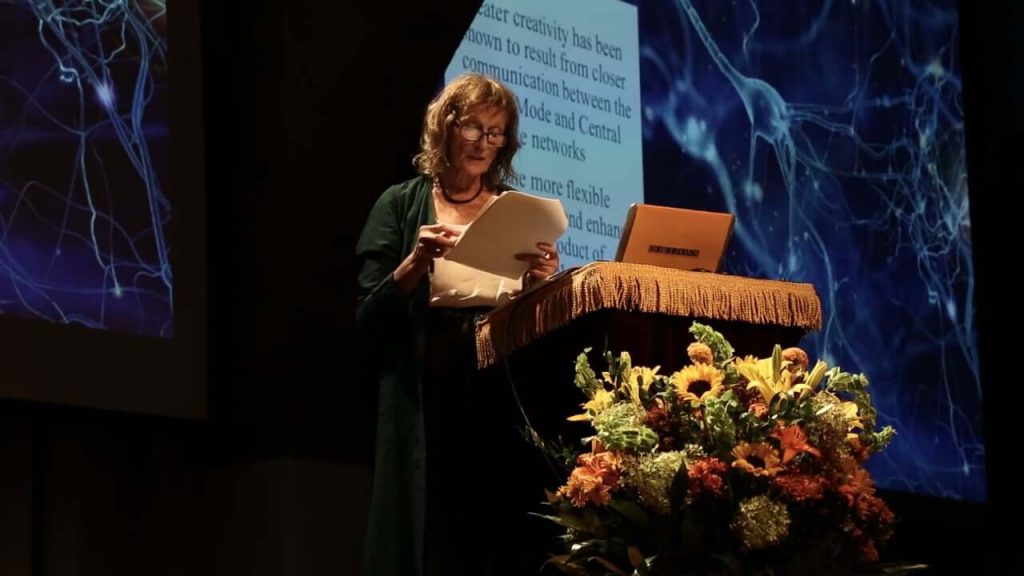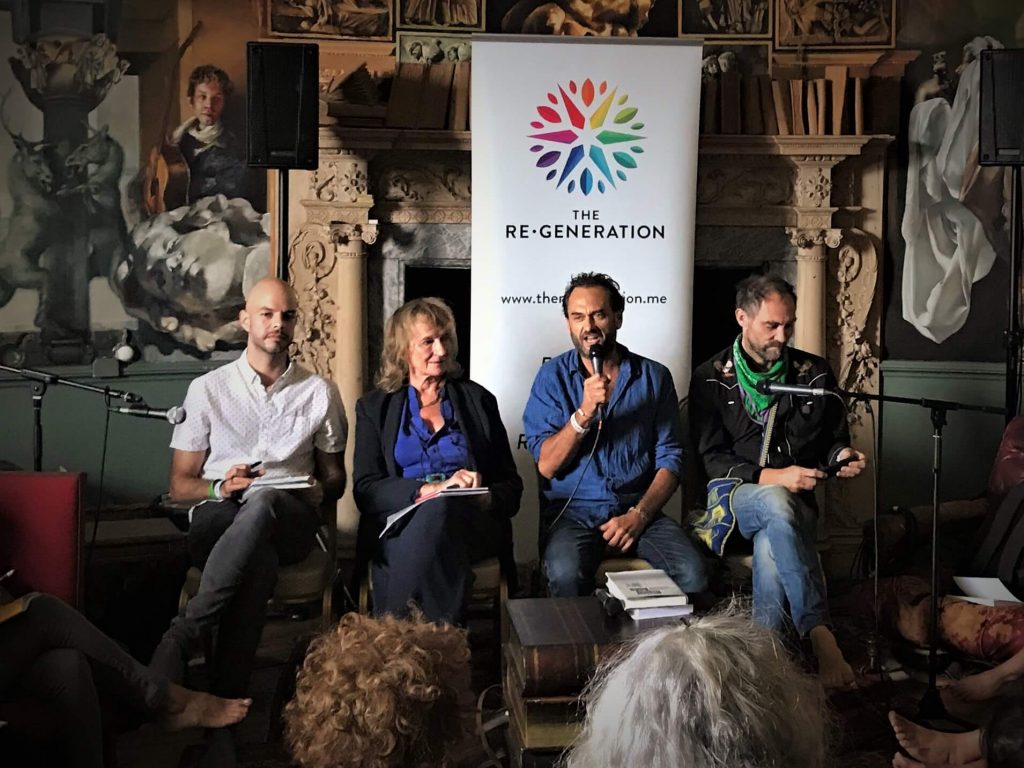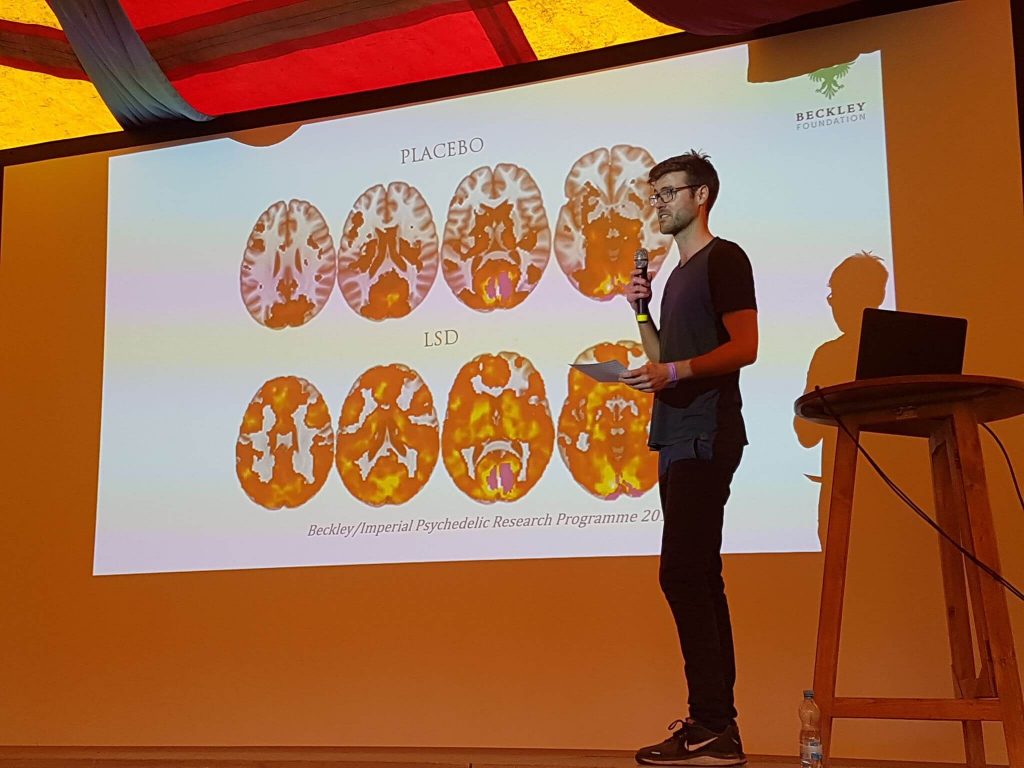
Breaking Convention 2019
The 5th International Conference on Psychedelic Consciousness was held at the University of Greenwich on 16-18th August. This is the biggest psychedelic conference in Europe and has gathered a dedicated following due to its multidisciplinary conglomeration of experts from every facet of psychedelics and consciousness.
The Beckley Foundation was a proud gold sponsor of Breaking Convention 2019, where the world’s top psychedelic researchers and the psychedelic community assembled in London to connect, discuss and disseminate the latest psychedelic research.
Some 300 speakers converged at the conference, along with artists, workshop leaders, musicians, comedians, performers and, tech installation creators.

Amanda Feilding shared her research into psychedelic microdosing at 11:30am on Friday, the 16th of August, in the Hofmann Hall. Amanda was among the first advocates of LSD microdosing after she discovered it during the mid 1960’s, when LSD was still legal, and found it to have a variety of benefits. As part of her work with the Beckley Foundation, Amanda has instigated a number of pioneering studies with leading university research groups, including Imperial College London and the University of Maastricht, to better study microdosing and its effects on cognition, mood, focus, wellbeing, creativity and brain activity.
“In the 60s, I used LSD on a regular basis, like a psychovitamin, to enhance work, creativity, self-discovery and enjoyment and to get a new and more profound insight into psychology, physiology and the science of consciousness. This period of my life fundamentally influenced my future endeavours. I decided to devote my life to understanding more about the brain and how to improve its functioning, and to undertake scientific research to unravel the mysteries underlying consciousness and its altered states. 50 years later we did the first brain imaging study with full dose LSD.” Amanda Feilding
After her talk, Amanda spoke on a panel with other microdosing researchers, including David Erritzoe, with whom she is collaborating on the self-blinded microdosing survey, and Torsten Passie, with whom she has previously collaborated on the use of 2-bromo-LSD to treated cluster headaches. Devine Terhune and Dimitris Liokaftos of Goldsmiths, University of London, also featured on the panel. Devin discussed research on the effects of an LSD microdose on time perception and response to suggestion. While Dimitris discussed results of an analysis of representations of microdosing psychedelics in the mainstream media. This panel brought together cutting edge microdosing research as we approach the completion dates of the Beckley Foundation’s collaborative investigations into psychedelic microdosing.

A number of Beckley Foundation collaborators also spoke at Breaking Convention, outside of this microdosing panel.
As part of the Beckley/Imperial Research Programme, Chris Timmerman discussed ‘Dynamic Transitions of Consciousness: An EEG Study Using DMT’ looking at the pioneering research into N,N,Dimethyltryptamine (DMT) using EEG to capture the dynamic transitions from normal waking to the psychedelic DMT state, and coupling this to the subjective effects people experience under this most powerful of psychedelics.
Meanwhile, David Erritzoe gave a talk titled ‘What we (don’t) know about psychedelic microdosing’, discussing our collaborative research into microdosing, including the novel “self-blinding” approach to improve surveys, and the preliminary data from an Imperial College prospective online survey.
As part of the Beckley/Brazil Research Programme,Stevens Rehen shared the ‘Biological Effects of Psychedelics in Human Neural Stem Cells and Brain Organoids’. He will be discussing his research into the effects of harmine, DMT and 5-MeO-DMT on human brain tissue derived from pluripotent stem cells, and how these compounds affect neurogenesis and neuroplasticity signalling pathways.
As part of the Beckley/Maastricht Programme, Natasha Mason spoke about the ‘(Sub-) acute effects of psilocybin on creativity, empathy, and satisfaction with life’. Her research is looking at the effect of moderate dosages of psilocybin on creativity, empathy, life satisfaction, and how these traits change with time following an experience.
This year, Breaking Convention focussed attention on the global ecological crisis by holding a symposium on Psychedelics, Eco-Consciousness & Ecological Crisis’. The opening talk ‘From Egoism to Ecoism: Psychedelics and Nature Connection’, was given by Beckley Foundation scientific assistant Sam Gandy. Sam’s talk described the capacity of psychedelics to increase human nature connection in the long-term, with important implications for individuals, society, and the biosphere at large, in a time of increasing disconnection.

Beckley Foundation content manager Sasha Frost gave a talk titled ‘Metaphor, Myths & Psychedelics’, discussing the metaphors in use which shape audiences understanding of psychedelics. Sasha’s talk explores how carefully worded content has the power to change the conversation regarding psychedelics, and challenge pre-existing structures that limit discussion.
The Biennial nature of Breaking Convention kept everyone in the psychedelic space bursting with anticipation since the last conference in 2017. So much progress took place in this field during the two years in between and the Beckley Foundation was excited to share some of the biggest steps forward.
To find out more go to:
https://www.breakingconvention.co.uk/
Podcast
- All
Links
- All
Support
- All
BIPRP
- All
Science Talk
- All
Amanda's Talks
- All
- Video Talk
- Featured
- 2016 Onwards
- 2011-2015
- 2010 and Earlier
- Science Talk
- Policy Talk
One-pager
- All
Music
- All
Amanda Feilding
- All
Events
- All
Highlights
- All
Psilocybin for Depression
- All
Current
- All
Category
- All
- Science
- Policy
- Culture
Substance/Method
- All
- Opiates
- Novel Psychoactive Substances
- Meditation
- Trepanation
- LSD
- Psilocybin
- Cannabis/cannabinoids
- Ayahuasca/DMT
- Coca/Cocaine
- MDMA
Collaboration
- All
- Beckley/Brazil Research Programme
- Beckley/Maastricht Research Programme
- Exeter University
- ICEERS
- Beckley/Sant Pau Research Programme
- University College London
- New York University
- Cardiff University
- Madrid Computense University
- Ethnobotanicals Research Programme
- Freiburg University
- Medical Office for Psychiatry and Psychotherapy, Solothurn
- Beckley/Sechenov Institute Research programme
- Hannover Medical School
- Beckley/Imperial Research Programme
- King's College London
- Johns Hopkins University
Clinical Application
- All
- Depression
- Addictions
- Anxiety
- Psychosis
- PTSD
- Cancer
- Cluster Headaches
Policy Focus
- All
- Policy Reports
- Advisory Work
- Seminar Series
- Advocacy/Campaigns
Type of publication
- All
- Original research
- Report
- Review
- Opinion/Correspondence
- Book
- Book chapter
- Conference abstract
- Petition/campaign
Search type